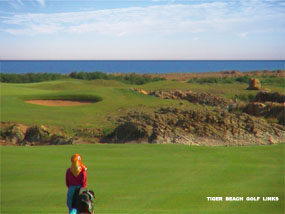|
Tiger Beach Golf Links has been
called an “Asian miracle” in Korea, Europe and
Scotland. Its inexperienced designer, club owner Beta Soong,
has sacrificed much energy in the construction of Tiger
Beach that has now become known as a golfer’s paradise.
The Secret Behind The Garden?
I had heard of Tiger Beach for
a long time but I knew little about it. In addition, Tiger
Beach is also known by its Chinese name as “Haiyang
Silport Golf Links.” The pronunciation “hai”
is the same as “ocean” while “yang”
translates into “sunshine.” I mistakenly called
it “Ocean Silport” as it runs along the coast.
In addition, its sister course is Shanghai Silport Golf
Club.
It was a surprise to hear that the designer of Tiger Beach
is Beta Soong -- the president of Silport Group. So why
did a successful entrepreneur choose to enter the golf world?
Was there a secret behind this beautiful seaside garden?
These questions hovered around my head during my travel
to Tiger Beach.
The Desolate Land
On one of his trips to Shandong,
Beta happened to come across a grand piece of ground that
he visualized would be perfect for creating a golf links
in Haiyang. Beta said that at the time, it was barren land
and very inconvenient to travel to -- about two and half
hours from Qingdao Airport. In the early days of construction,
life was hard for everyone. For example, the washroom was
far away from the staff dormitories. Ladies from the city
who were afraid of the dark had to refrain from drinking
water to prevent going to the washroom.
According to Beta, as the area’s climate and terrain
were similar to Scotland he decided to buy the land to realize
his Scottish golf links dream. He was eager to build a simple,
spontaneous links course that was integrated with nature.
On trips to Scotland and the country’s famed St Andrews
Golf Links, he had been impressed by its wideness and natural
beauty. Pursuing the Scottish golf links spirit was becoming
a very important part of his life.
Blooming Inside and Fragrant
Outside
Following its completion in July
2000, Tiger Beach attracted many international designers.
In 2001, the famous Japanese designer Shunsuke Kato visited
the course and described it as a fantastic golf links.
The following year, on June 29th, 2002, Tiger Beach signed
a sister-links agreement with Scotland’s Carnoustie
Golf Links. It is the first time that the Scottish club
had signed with anybody in its more than 300 years history.
So the reputation of Tiger Beach was spreading quickly around
the world.
Paul Burley, the golf superintendent at Scotland’s
Turnberry Golf Course, a 36-hole layout ranked among the
top-10 courses in the world, wrote to Beta that the “photos
from your course were awe inspiring. I am wondering how
you could create such a course. It looks great! Congratulations.”
Jhon Straun, the chief designer from the Robert Jones Company
and an authority in the golf design field, was also impressed
with what had been created at Tiger Beach.
In addition to the heavy coverage from the Western media,
Tiger Beach also caught the attention of a prestigious Korean
newspaper---- Leisure News. In March 2004, It chose the
three best designers representing China, Korea and Japan.
Beta was lucky to be selected as the China representative
along with Syunyuke Kato (creator of Tomson Pudong Shanghai
Golf Club) from Japan and Kim Myong Gil from Korea.
While Tiger Beach Golf Links has been admired by many professionals
abroad, it is still little known among native Chinese. It
sits silently in lonely Haiyang with honor. Therefore, Tiger
Beach is like a flower blooming inside but fragrant outside.
Too High to
be Popular?
Beta believes “a professional course depends mostly
on heart and energy but not on capital and facilities.”
Compared with prominent international designers who visit
a building site several times a year, Beta tried his best
to design his course through a lot of time and consideration.
He sees Tiger Beach as his own baby.
Brad Chi, Tiger Beach’s vice general manager, has
been at the 18-hole course for the entire construction process.
He says in the mornings Beta could never be found for breakfast
because he had been on the course from 5am. If he came across
something that was imperfect, he would stop for the whole
day to think about what improvements could be made and could
not be found until it was time for supper.
Unbalanced Fairways
Beta sacrificed all his energy
to build the Tiger Beach. If the finished holes that did
not compare with what he had imagined, he would flatten
it and rebuild. When the whole
links course was first completed, he found that the inward
nine holes did not match the outward nine.
He decided to rebuild it again as his purpose was to design
a links where the holes varied naturally. As an avid collector
of antiques, Beta created Tiger Beach almost as if it was
a piece of art. The long rough and changing winds dominate
the canvas-like layout. There is no fixed tragedy for each
hole. Creativeness and flexibility are necessary for hitters
to fight against the stiff wind and deep bunkers. For serious
golfers, the spirit of such a links course has to be experienced
for its sheer charm.
From Golf Magazine China
June 2004
|